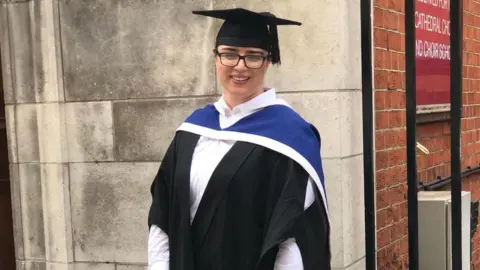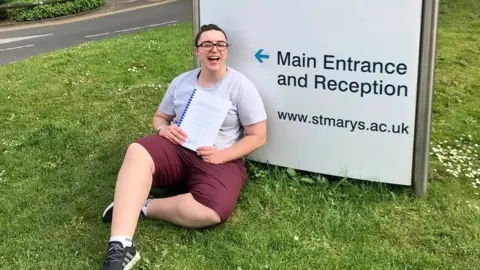'I didn't think university was for an Irish Traveller like me'
 Chelsea McDonagh
Chelsea McDonaghChelsea McDonagh is the first in her family to go to university.
"In school I struggled to see the what the point was. I thought I wasn't academic enough for uni," she tells Radio 1 Newsbeat.
The 23-year-old is an Irish Traveller.
Research by Kings' College London found that people from Gypsy, Roma and Traveller communities are statistically less likely to go on to higher education compared to the general population.
"I grew up on a traveller site in south London, my parents travelled around then settled there in the 90s," she explains.
"Settling meant that we could get a proper education. It gives you a balance between maintaining your culture but also being able to engage in mainstream society."
Allow X content?
But when Chelsea left school in 2012, she didn't know what to do with her life and didn't think university was for her.
However, through support from friends and teachers she was encouraged to apply.
She was the first in her family to consider going into higher education which meant she had nobody to turn to for help during the application process.
"My parents couldn't guide me through Ucas because they didn't know how to," says Chelsea.
"They had little knowledge of the education system and how it worked - my tutors filled that role in for me."
Allow X content?
In a thread on Twitter, Chelsea said at one point she even considered withdrawing her application because she was "petrified" that she wouldn't be good enough.
But the "unwavering" support of her teachers made all the difference and gave her the confidence to succeed.
Chelsea graduated in 2018 with a first class degree in physical and sport education from St Mary's University in Twickenham.
She is now doing a masters in education at Kings' College London.
Allow X content?

According to Ucas, only 70 students identifying as Gypsy, Roma or Traveller (GRT) in the UK were accepted into university last year - compared to 350,000 nationally.
The Office for Students suggests the barriers which limit these groups from accessing higher education include:
- Cultural barriers such as mobility, language, cultural norms and identities
- Material barriers such as poverty, inadequate housing, homelessness and access to healthcare
- Discrimination in schools, higher education and the media
- Bullying and racism
- Parental lack of knowledge and experience of the UK education system
Chelsea says her parents didn't fully understand how she would be able to afford to go to university.
"When speaking about the £9,000 uni fees my mum said we can't afford this, we don't have that money," says Chelsea.
"They didn't understand how the student loan system worked.
"They wanted to understand but they just couldn't."
 Chelsea McDonagh
Chelsea McDonaghChelsea says she thoroughly enjoyed her experience at university, but that might not be the same for everyone.
"A lot of people will tick White British or White Irish instead of Traveller when applying so that they don't face discrimination," she said.
"My only piece of advice for a young Traveller thinking of applying would be, 'Don't be scared to do it, find what's right for you and go for it'."


